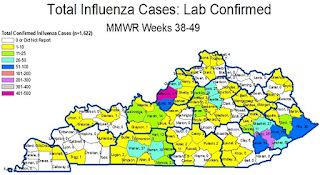Four flu-related deaths have been reported in Kentucky; state health commissioner urges everyone to get vaccinated

By Melissa Patrick
Kentucky Health News
The Kentucky Department of Public Health has reported the first four influenza-related deaths of the 2019-2020 flu season, which runs through May.
“We extend our condolences to the families who have suffered losses during this flu season,” Dr. Angela Dearinger, commissioner of the agency, said in a news release. “These personal losses are a reminder for all of us that flu can be a serious illness, for young and old alike, and we strongly encourage people to protect themselves by getting a flu vaccination.”
Dearinger added that it is especially important for children and high-risk adults to get vaccinated, since they are at higher risk of complications and negative consequences, including death. She also encouraged anyone with flu to stay home and avoid contact with others.
It’s also important to practice good hygiene, covering your cough and making sure you are washing your hands with soap and water for at least 20 seconds — or the time it takes to sing “Happy Birthday” twice.
Because flu germs linger on surfaces, it’s also important to wash your hands after coughing, touching a door knob or handrail, or shaking hands. One regional health official has even advised Kentuckians to avoid handshaking during the flu season, calling it “the worst thing you can do.”
The federal Centers for Disease Control and Prevention recommends washing hands with soap and water whenever possible, and if not, to use a hand sanitizer with at least 60 percent alcohol.
The state health department has also upgraded the state’s flu activity level to “widespread,” which is the highest classification and is applied when increases in flu cases have been confirmed in at least half of the state’s 17 health regions.
During the week of Dec. 1-7, Kentucky saw 511 new confirmed cases of flu, with increases in 10 of the state’s 17 health regions. Since Aug. 4, there have been 1,622 confirmed cases in the state, and all four of reported deaths were adults, according to the weekly influenza surveillance report. The number of cases is likely under-reported; health officials have said many health-care providers stop submitting cases for laboratory confirmation once flu becomes widespread.
Last season, the state had 17,665 lab-confirmed cases and 196 flu-related deaths, including two children.
Flu symptoms include fever, headache, cough, sore throat, runny nose, sneezing and body aches. It is highly contagious. Persons who develop symptoms should contact their medical provider immediately to determine if they are a good candidate for treatment with an antiviral drug, which could shorten the course of the illness or reduce its severity.
The CDC says everyone over six months old should get a flu shot, and especially encourages people who may be at higher risk for complications or negative consequences to get one, including children 6 months to 5 years old and their caregivers; women who are or might be pregnant during flu season; people 50 and older and their caregivers; obese people; those with chronic health problems; residents of long-term care facilities, and health-care workers.
Vaccinations can be given any time during the flu season, but take about two weeks following the administration of the vaccine for the recipient to develop protection from the flu.
If you’re looking for a place to get your flu shot, the CDC offers an interactive “flu vaccine finder” that allows you to type in your ZIP code and find nearby locations that offer shots. Local health departments offer the vaccine. Medicaid and Medicare and most private insurance providers cover flu vaccination at no cost, as a preventive service.